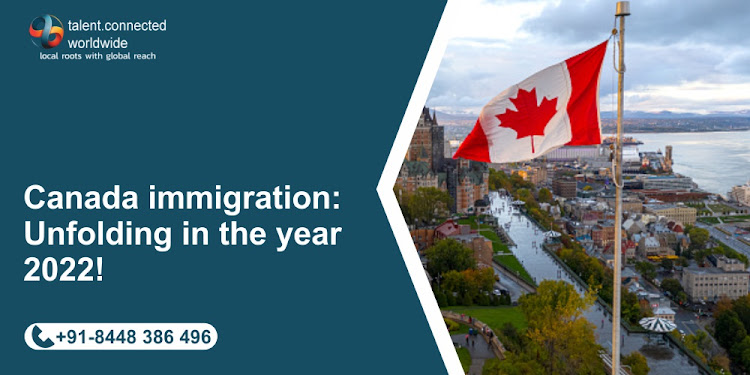Canada immigration: Unfolding in the year 2022!
As a result of regulatory adjustments in response to the COVID-19 epidemic, Canada's immigration procedures encountered significant difficulties and delays in 2021. You can also consult Canada immigration consultants in Delhi for insights.
Many candidates within Canada received new immigration programmes and rules in 2021 to make it easier for them to stay, but many applicants from outside the country were barred from consideration owing to COVID-19 regulations. With the start of a new year, it's time to consider what to expect in terms of Canadian immigration in 2022.Canada expects to
welcome 411,000 additional immigrants by 2022. While this would not normally be
a problem for Canada, the government has failed to process applications in a
timely manner during the last year, resulting in a 1.8 million application
backlog. If Immigration, Refugees and Citizenship Canada (IRCC) can reduce its
backlog, 2022 could be a watershed year for Canadian immigration.
Changes to Canadian immigration in
2022
1.
Uplifts restrictions
During the early
stages of the COVID-19 pandemic, Canada was subjected to travel restrictions.
The removal of such limitations will aid in the recovery of newcomer flows,
giving the country's economy a much-needed boost.
2.
Express entry draws 2022
While Express
Entry drawings continued during the pandemic, they were significantly different
in 2021 from pre-pandemic norms. Prior to the outbreak, an Express Entry
lottery was held every two weeks, and candidates from all Express Entry
programmes were eligible to participate. Since September 15, 2021, only
provincial nominees have been invited to Express Entry draws. This is the case
due to the existing backlog of immigration requests. Due to a shortage of
capacity to handle new files, IRCC is currently unable to issue significant
quantities of Invitations to Apply. In a recent message, IRCC claimed that once
the backlog is reduced, all programme Express Entry drawings will resume — but
they did not define how long this will take or how much of the backlog they
must remove.
3.
CRS score may decrease
With the
resumption of CEC draws in Canada, it is expected that the lowest CRS score
would drop. We noted the lowest CRS score this year was fairly high due to COVID-19,
thus we expect it to decline in 2022 in order to reach ITA standards.
Want to know your
CRS score? Contact Canada PR agency.
4.
New NOC changes
The most recent
fundamental update to the NOC system occurred in 2016. The 2021 changes are
expected to take effect in the fall of 2022. This is to provide candidates a
chance to learn more about the updated application process.
The NOC's
structure was altered in three major areas in order to make it more consistent,
precise, and versatile. These changes may have an impact on your Canada Express
Entry application because the old skill type categories NOC A, B, C, and D are
no longer used to designate your expertise. Instead, a new TEER system has been
implemented.
5.
2021-2023 Canadian immigration level plans
Through the
Government of Canada's Immigration Levels Plan, IRCC hopes to welcome 401,000
new permanent residents in 2021, 411,000 in 2022, and 421,000 in 2023.
The annual number
of arrivals will rise year after year, resulting in the highest level of
immigration in Canada's modern history.
You can know more
from Canada immigration consultants in
Delhi.



Comments
Post a Comment